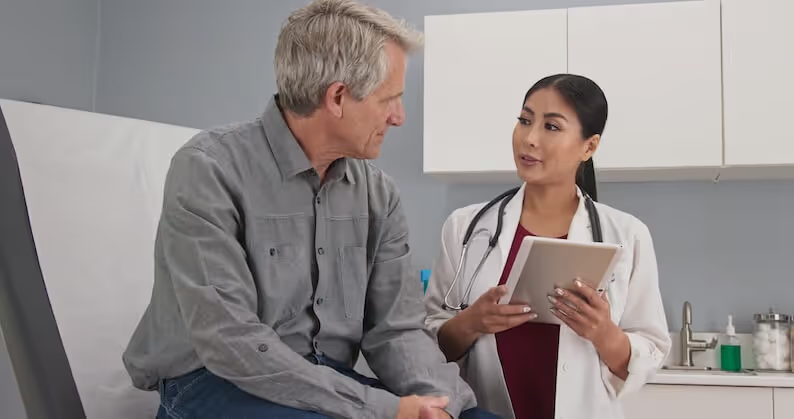As we get older, our health needs change. Regular checkups and open conversations with your healthcare provider become even more important. But let’s be honest—most doctor visits feel rushed or even overwhelming.You have so much you want to discuss with your doctor, only to leave the office and suddenly realize you forgot to ask all the questions you had intended to.
That’s why you have to be prepared. Asking the right questions can help you better understand your health, avoid confusion, and feel more in control of your care. If you’re a senior—or caring for one—here are the top 5 questions you should ask your doctor or healthcare provider. Print them out, jot them down, or keep them in your phone. These questions can help make the most of every visit.
1. What screenings or tests do I need at my age?
This is one of the most important questions to discuss with your doctor. Prevention is key to better health. Health screenings give you the opportunity to catch potential health issues early before they become serious. That’s especially important as we get older, since the risk of certain conditions(like heart disease, diabetes, cancer, and osteoporosis) increases with age. Some screenings are age-based, while others depend on your personal and family history.
Common screenings for older adults may include:
- Blood pressure and cholesterol checks
- Bone density scan
- Mammogram or prostate exam
- Colon cancer screening
- Vision and hearing tests
- Diabetes screenings
Ask your provider:
- Am I due for any screenings?
- How often should I get these done?
- Do I need any lab work or imaging?
2. Are all my medications still necessary?
It’s common for many seniors to take multiple medications to manage different health conditions. But over time, your health needs can change, and so can your body’s response to certain drugs. That’s why it’s important to regularly review your medications with your doctor. Some prescriptions may no longer be needed, while others might interact with new medications or cause unwanted side effects. Asking about your current medications helps ensure you’re only taking what’s truly helpful—and nothing more.
Always bring a list of everything you are taking, including over-the-counter drugs as well as vitamins and herbal supplements.
Ask your provider:
- Do I still need all these medications?
- Are there any side effects I should watch for?
- Can any of these medications interact with each other—or with over-the-counter vitamins or supplements I take?
3. What vaccines do I need to stay protected?
Many people tend to think vaccines are just for children. But that certainly is not the case. As we age, our immune systems become weaker, making us more vulnerable to certain infections. Certain illnesses, like the flu, pneumonia, shingles, and COVID-19,can be more serious in seniors. That’s where vaccines come into play. Staying up to date on recommended vaccines can help prevent complications and keep you out of the hospital.
Recommended vaccines for seniors often include:
- Flu shot (every year)
- Shingles vaccine (usually two doses after age 50
- Pneumonia vaccine
- COVID-19 vaccines and boosters
- Tdap booster (for tetanus, diphtheria, and whooping cough)
Ask your provider:
- Am I up to date on my vaccines?
- Do I need the shingles or pneumonia shot?
- What about the flu or COVID vaccines?
4. How is my memory and mental health?
It’s normal to forget where you put your keys now and then, but memory loss that affects daily life shouldn’t be ignored. The same goes for feeling down, anxious, or lonely. Your mental health is just as important as your physical health, and it deserves attention, too.
Memory issues and mental health concerns often go unspoken. The earlier you talk about it, the more options there are to support your wellbeing and independence. It can help to talk openly with your provider about how you're feeling emotionally—especially after big life changes like retirement, loss, or illness. If needed, your provider may suggest counseling, support groups, or safe treatments.
Ask your provider:
- Is my memory okay for my age?
- Should I be concerned about confusion or forgetfulness?
- How do I know if I'm just feeling low or if I'm dealing with depression or anxiety?
5. What can I do at home to stay healthy and prevent illness?
Staying healthy isn’t just about doctor visits—it’s about the choices you make every day at home. From the foods you eat to how active you are, small lifestyle habits can have a big impact on your overall well-being. Your provider can guide you on safe, practical ways to support your health right from the comfort of your home.
Ask your provider:
- What kind of exercise is safe for me?
- Should I be eating differently at my age?
- How can I improve my sleep or energy?
Speak Up and Be a Partner in Your Healthcare Journey
Your doctor is your partner in health—but you’re the expert on how you feel. Don’t be afraid to ask questions, bring notes, or speak up if something doesn’t make sense or feel right. There are no wrong questions when it comes to your health.
At VIPcare, we specialize in senior-focused primary care. Our providers take time to listen, answer your questions, and tailor care to your specific needs. From preventive screenings to chronic condition management, we’re here to support your health and your goals. Schedule an appointment today!




